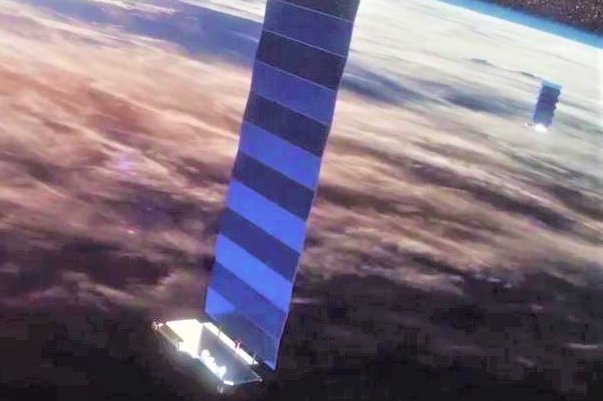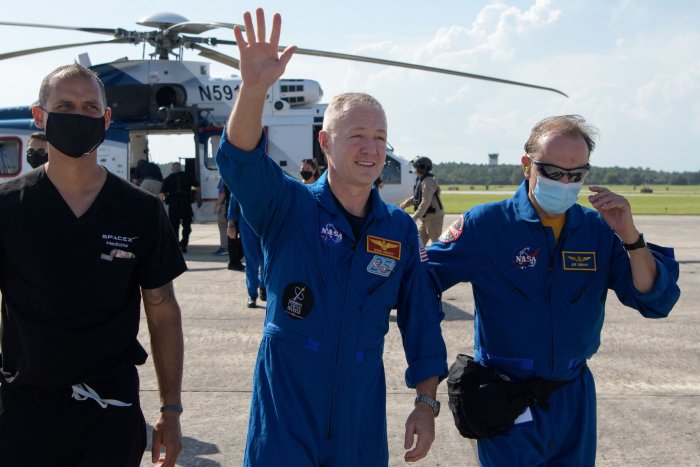1 of 2 | SpaceX is signing up potential customers for broadband Internet service provided by the company's Starlink satellite constellation. File Image courtesy of SpaceX
ORLANDO, Fla., June 25 (UPI) -- Some Internet users will test SpaceX's Starlink satellite broadband service soon, as the company prepares another launch in Florida on Friday to boost the number of communications satellites in orbit to almost 600.
A SpaceX Falcon 9 rocket carrying 57 Starlink spacecraft is scheduled to lift off at 4:18 p.m. EDT from Launch Complex 39A at Kennedy Space Center. The flight also will carry two small Earth observation satellites for Seattle-based BlackSky Global.
An outlook for isolated storms Friday means a 40 percent likelihood of cancellation because of heavy cloud cover and the threat of lightning, according to the U.S. Air Force forecast. SpaceX postponed the launch Thursday because of a similar weather outlook.
Elon Musk's SpaceX began sign-ups June 12 for users who want to try the Starlink Internet service in what the tech community calls a beta test -- a validation of new technology in a small sample of the targeted eventual user.
Starlink will be available to any individual or organization, the company said, but the cost of the service hasn't been announced.
"Private beta testing is expected to begin later this summer, followed by public beta testing, starting with higher latitudes," SpaceX said in an email sent to those who signed up. The company said those interested would be notified when testing begins in their market.
Testing is to kick off in Seattle and Germany, the company said. Musk said on Twitter previously that Starlink Internet speeds would support competitive online gaming in real time.
SpaceX board member and venture capitalist Steve Jurvetson, who was an early investor in Hotmail, tested the service with a Starlink terminal at the company's headquarters in Hawthorne, Calif.
"Simplest out-of-box experience imaginable," Jurvetson said on Twitter on June 12. "Can't wait to upgrade my broadband later this year!"
Musk replied to him, "It will get even simpler. Just two instructions for Starlink: Plug in & point at sky. Can be done in either order."
SpaceX aims to launch thousands of Starlink satellites. More complete testing will be available with the constellation reaches about 800, company officials have said.
Launching Starlink regularly means SpaceX can take other paying customers, such as BlackSky, along for the ride -- and for revenue.
BlackSky's satellites are part of SpaceX's ride-share launch program, which offers a relatively low cost for launching small satellites since they are packed in with regular Starlink satellites.
The SpaceX ride-share program is filling a need for more launch availability, said Shagun Sachdeva, an analyst with Northern Sky Research who is based in France.
"Starlink ride-share launches seem to be a strategic move to get more revenue streams coming in, since SpaceX isn't making money from Starlink yet," Sachdeva said.
Friday's launch is to be the second Starlink mission in a row to carry small satellites for Earth observation, Sachdeva noted. The company launched three small imaging satellites for San Francisco-based Planet, formerly Planet Labs, earlier this month.
BlackSky offers images and monitoring from space for industries that include defense, energy, construction and research. BlackSky obtained a $50 million investment in 2019 from Luxembourg-based Intelsat, a communications satellite service, to build a new constellation of Earth-imaging satellites.
"When it comes to Earth observation from satellites, there is more demand today than ever for higher resolution imaging," Sachdeva said.
The launch will boost BlackSky's network in space to six satellites, with a short-term goal of 16 satellites in orbit. They weigh about 120 pounds each and are designed to last only a few years before they need replacement.
NASA astronaut Douglas Hurley (C) waves to onlookers as he boards a plane at Naval Air Station Pensacola to return him and NASA astronaut Robert Behnken home to Houston a few hours after the duo landed in their SpaceX Crew Dragon Endeavour spacecraft off the coast of Pensacola, Fla,, on August 2, 2020. Photo by Bill Ingalls/NASA |
License Photo
















